Business in Kuwait, Economy, Oil, Exports

Kuwaiti Economy and Foreign Trade. Business in Kuwait City. Petroleum. Businessman
- Introduction to the State of Kuwait (Middle East)
- Kuwaiti Economy
- Business in Kuwait City
- Business Opportunities in Kuwait
- Foreign Trade of Kuwait
- Access to the China-Pakistan Corridor
- Investment in Kuwait
- Case Study: Kuwaiti Petroleum industry diversification
- Arab Fund for Economic and Social Development
- Kuwait Fund for Arab Economic Development
- Access to the Kuwaiti market
- Business Plan for Kuwait
Kuwaiti Businessman.
The objectives of the subject “International Trade and Business in the State of Kuwait” are the following:
- To analyze the Kuwaiti Economy and Foreign Trade
- To know the trade opportunities in the State of Kuwait
- To explore the Kuwaiti trade relations with the country of the student
- To know the Kuwaiti Trade Agreements
- To examine the profile of Kuwaiti Businesspeople
- To know the importance of the Kuwaiti funds for development
- To develop a business plan for the Kuwaiti market

The Subject “Foreign Trade and Business in Kuwait” belongs to the following Online Programs taught by EENI Global Business School:
Doctorate: Islamic Business, World Trade.
Masters: International Business, Foreign Trade.
- Credits of the subject “Doing Business in Kuwait”: 1

- Duration: one week
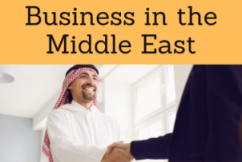
Global Trade and Business in Kuwait:
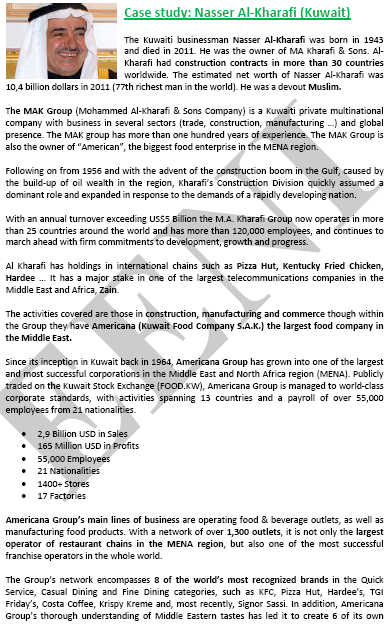

Kuwaiti Preferential Access and Trade Agreements:
- Kuwait and the Arab Economic Area
- Gulf Cooperation Council
- EU-GCC
- India-GCC
- Australia-GCC Agreement
- Trade Agreements (as a member of the GCC with China, Singapore, South Korea, the EFTA, New Zealand, Thailand, and the MERCOSUR
- Islamic Trade Preferential System
- Greater Arab Free-Trade Area (GAFTA)

- WTO
- GATS
- Agreement on Sanitary Measures
- Agreement on Technical Barriers to Trade
- Agreement on Preshipment Inspection
- Agreement on Safeguards
- Trade Facilitation Agreement
- WCO
- BIC
- Chicago Convention (ICAO)
- International Maritime Organization
- Istanbul Convention
- International Chamber of Shipping
- IRU
- TIR Convention
- Guidelines on Safe Load Securing for Road Transport
- Customs Convention on Containers - not a member
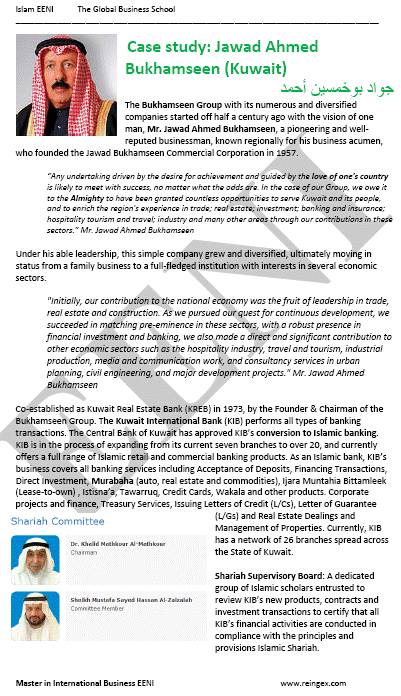

Islamic Organizations (Kuwait).
- Arab League
- Summit of South American-Arab Countries
- Asia-Middle East Dialogue
- Islamic Development Bank
- Economic Commission for Western Asia (ESCWA)
- OIC
- Committee for Economic Cooperation
- Islamic Chamber of Commerce
- Islamic Centre for Development of Trade
- Economic Centre for Islamic Countries
- Arab Gulf Programme
- OPEC Fund for International Development
- Afro-Arab Cooperation
- BADEA

- UN
- UNCTAD
- ITC
- UNCITRAL
- WIPO
- Asia Cooperation Dialogue
- WB
- WTO
- African Development Bank
- IMF
The State of Kuwait:
- The most populated Kuwaiti region is the capital, Kuwait City
- Besides being the economic and commercial centre of Kuwait, Kuwait City is a major oil and petroleum products production port
- Borders of Kuwait: Iraq and Saudi Arabia
- Population of Kuwait: 4 million people
- Area of Kuwait: 17,820 km²
- Kuwaiti official language: Arabic
- Abolition of Slavery in Kuwait: 1949
- Independence from the UK: 1961
religion in Kuwait.
- Islam Sunni is the main religion of Kuwait
- The main school of Islamic Jurisprudence is Maliki

Kuwait belongs to the Arab Economic Area.
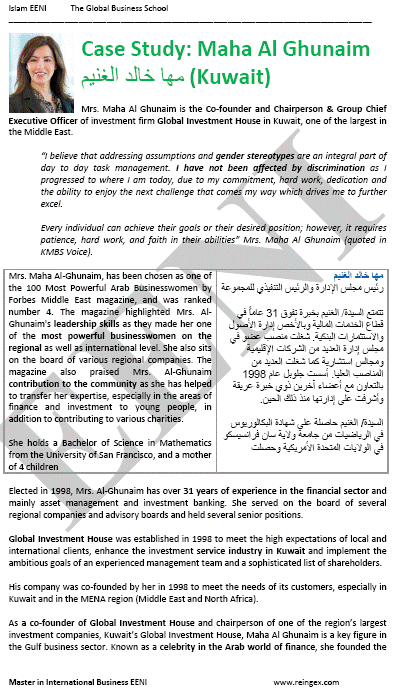
- Kuwaiti Economy is as small, wealthy, and open (GDP was 149,000 dollars);
- The vast petroleum reserves are the pillar of the Kuwaiti economy (petroleum and its derivatives generate 95% of the exports of the State of Kuwait)
- The State of Kuwait produces an average of 2.6 million barrels a day
- Proven natural gas reserves of the State of Kuwait: 1% of the world reserves
- In the non-Oil sector, the main activities are desalination, food processing, building materials, plastics, cement, and metal products
- The Kuwaiti services sector represents 34% of the GDP
- The Kuwait Stock Exchange is the third largest in the Middle East (behind Egypt and Saudi Arabia)
- Commercial distribution sector has grown significantly in the recent years (malls)
- Currency of Kuwait: Kuwaiti Dinar (KWD)
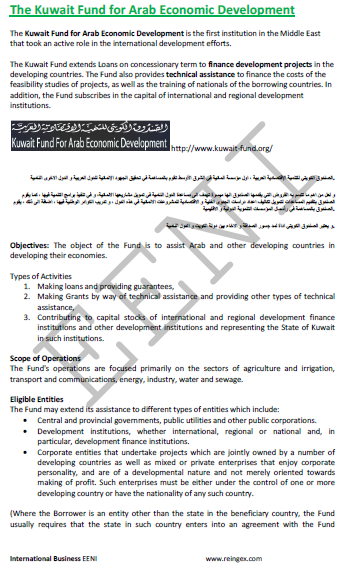

International Trade of Kuwait.
- The main products of the Kuwaiti Exports are petroleum, oil products and fertilizers
- The main Kuwaiti export destination are Japan 19.9%, South Korea 17%, Taiwan 11.2%, Singapore 9.9%, U.S. 8.4%, the Netherlands 4.8%, and China 4.4%
- The main products imported from the State of Kuwait products are food, building materials, cars and parts, and clothes
- The main origins of the Kuwaiti imports are the U.S. (12.7%), Japan (8.5%), Germany (7.3%), China (6.8%), South Korea, Saudi Arabia, Italy, and the UK
Kuwait has trade agreements (FTA) as a member of the GCC with China, South Korea, Australia, the EFTA, New Zealand, Thailand, and the MERCOSUR.
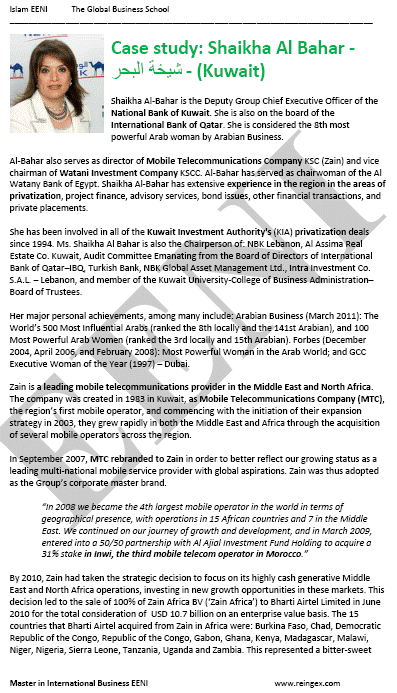
Sample -
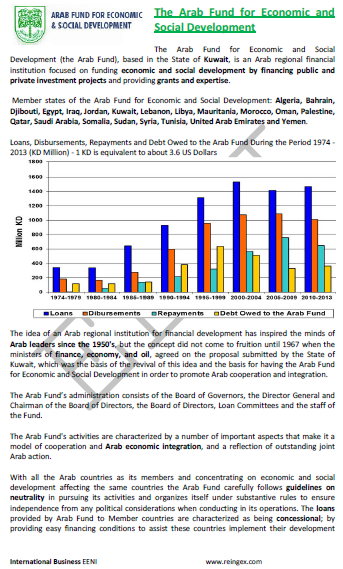
(c) EENI Global Business School (1995-2024)
We do not use cookies
Top of this page




 or
or 

